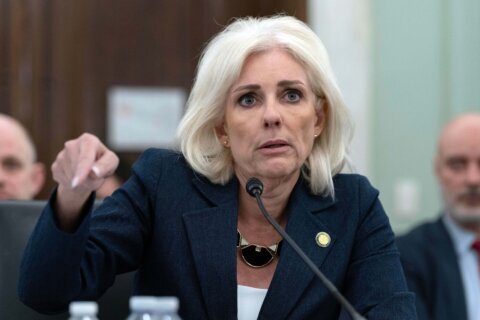This article was republished with permission from WTOP’s news partner InsideNoVa.com. Sign up for InsideNoVa.com’s free email subscription today.
This article was written by WTOP’s news partner InsideNoVa.com and republished with permission. Sign up for InsideNoVa.com’s free email subscription today.
In a minor setback for Fairfax County Public Schools, U.S. Solicitor General Elizabeth Prelogar filed a brief opposing the school system’s request for the U.S. Supreme Court to take up a discrimination lawsuit against the school division.
The case originated from a complaint by a former Oakton High School student who said she was sexually assaulted by another male student while on a band trip in 2017.
In the suit, filed in 2018, the plaintiff claims the school system did not take any action to ensure her safety, provide necessary medical attention or counseling or even respond to the reported sexual assault.
The plaintiff, who goes by Jane Doe to protect her identity, argued the school system’s failure to take action after she reported the incident violated her rights under Title IX because it caused her to struggle emotionally, academically and physically.
A trial in a federal court in 2019 found that Doe had been assaulted, but it did not find the school system liable and ruled in its favor.
Doe argued that the evidence did not support the verdict and requested a new trial. A judge rejected that request, but the Fourth Circuit overturned the decision and requested a new trial.
In that ruling, Judge Paul Niemeyer dissented, writing that the opinion “extends the liability of a high school under Title IX to cover damages sustained by a student from a single, isolated incident of student-on-student sexual harassment, of which the school had no knowledge until after the fact.”
However, Judge James Wynn wrote for the majority, saying it would be “absurd to require students to be sexually harassed or assaulted at least twice before a school can be held liable.”
In December, Fairfax County Public Schools asked the Supreme Court to weigh in on the case in hopes that it could restore “nationwide uniformity” on the issue. The school system points to a previous ruling by the high court as the basis for its request.
“In Davis v. Monroe County Board of Education, this court held that a funding recipient may be liable for its response to such allegations only where it ‘subjects its students to harassment’ and is ‘deliberately indifferent to sexual harassment, of which [the recipient] has actual knowledge,’” it said.
But last month, U.S. Solicitor General Prelogar opposed the school system’s request in a brief, agreeing with the Fourth Circuit’s ruling.
“This court’s precedents confirm that a school may be liable under Title IX for educational harms inflicted on a student by the school’s deliberate indifference to sexual harassment even when those harms do not include additional harassment,” she writes.
Fairfax County filed a response brief earlier this month, saying the Preglogar’s brief adds nothing to what Doe has already said and only rehashes her arguments.
Public Justice staff attorney Alexandra Brodsky said in a release she was grateful that the U.S. solicitor opposed the School Board’s petition.
“Fairfax’s extreme positions are legally wrong and would gut survivors’ civil rights,” Brodsky said.
She told InsideNoVa that they expect the high court to decide whether it will take up the case next month.
Fairfax County Public Schools currently faces a similar discrimination lawsuit from a woman who said the system failed to respond to her assault accusations in middle school.
The plaintiff, who uses the pseudonyms B.R. and Kate to protect her identity, made multiple attempts to inform school officials about the alleged assault and ongoing sexual harassment, but they ignored her and minimized her claims, she says.
Also, in 2020, the school district reached a settlement with the Department of Education’s Office of Civil Rights after female hockey players at Lake Braddock Secondary School were cut from the team after telling their principal they were being sexually harassed.
The settlement agreement requires the school district to train school staff responsible for handling sexual harassment cases, as well as its other employees, “regarding the obligations under Title IX.”







